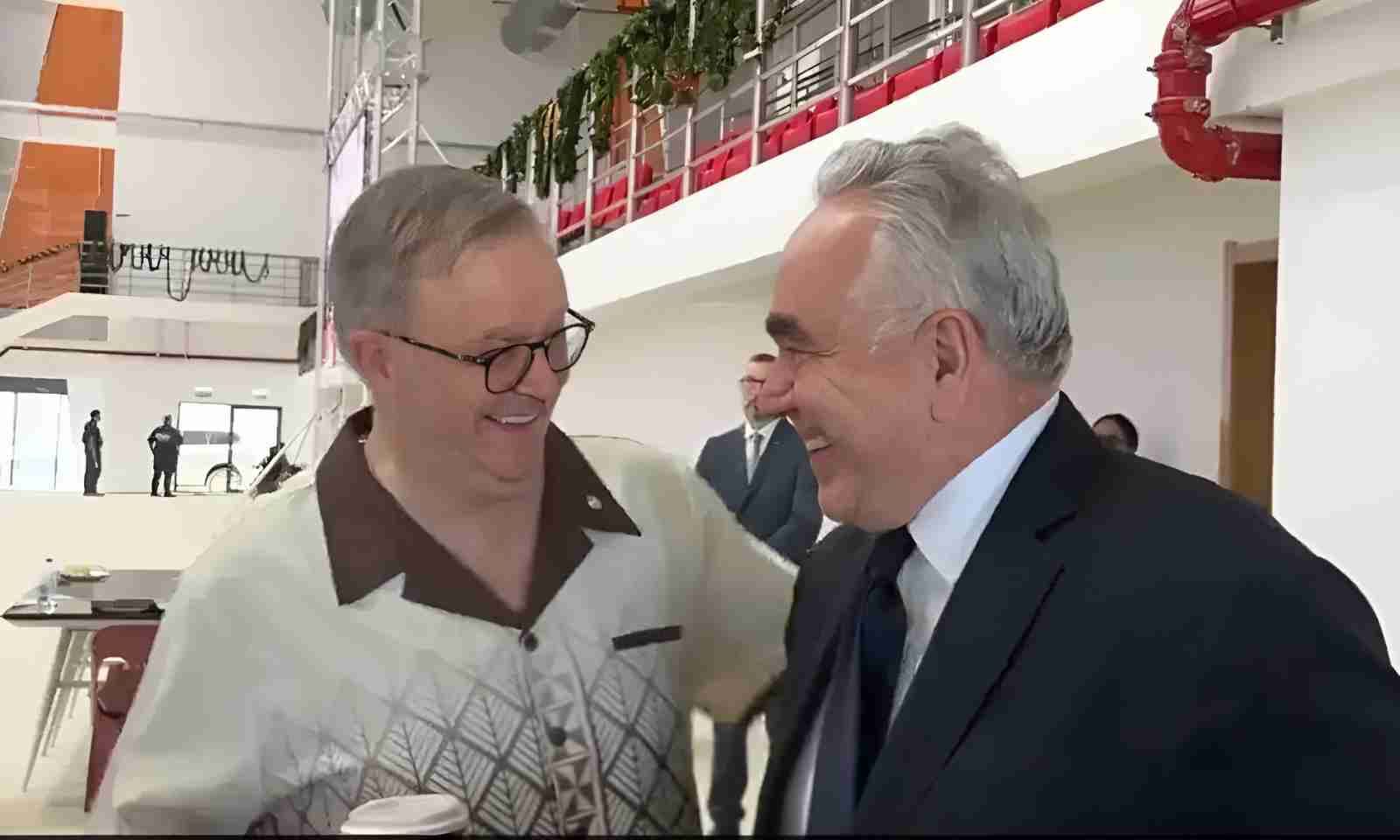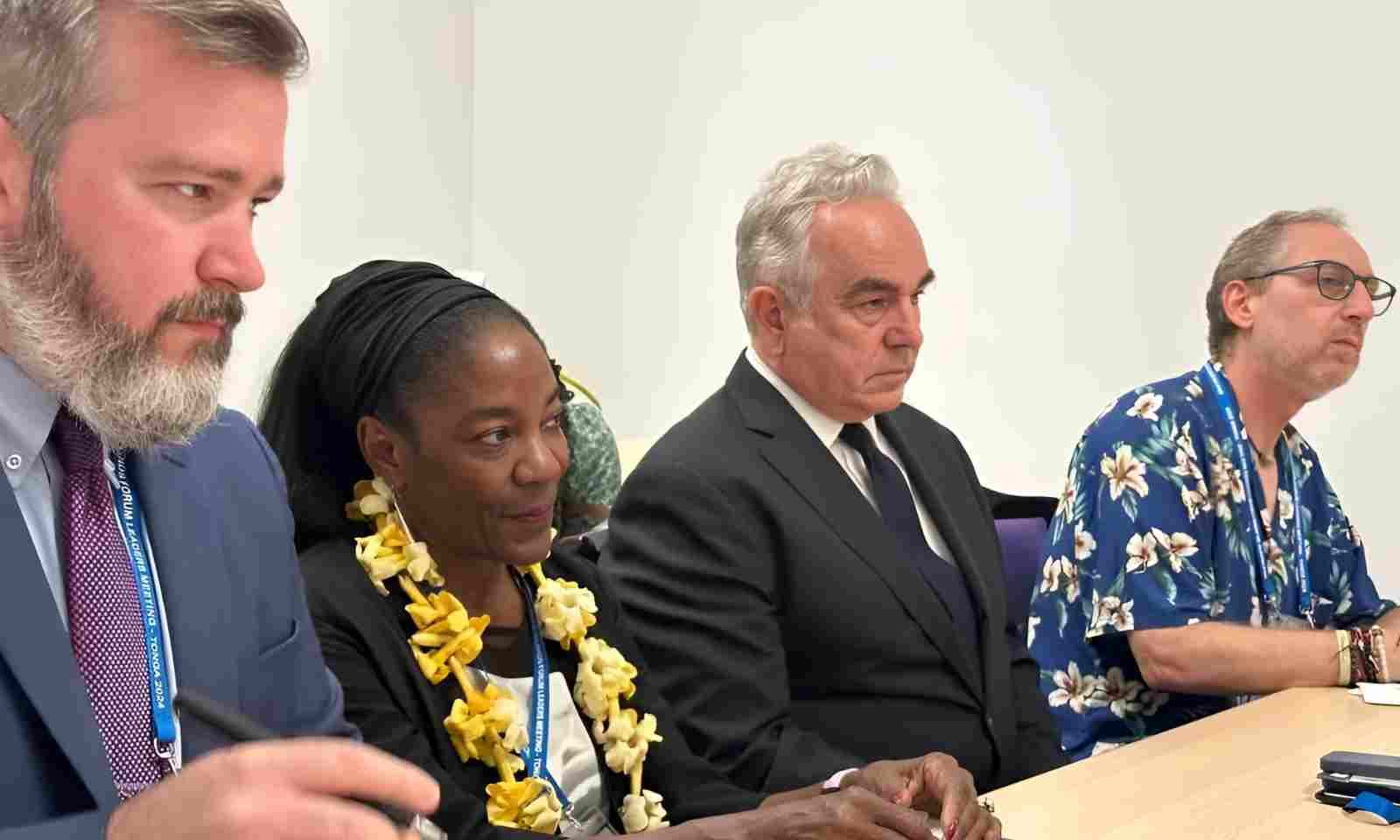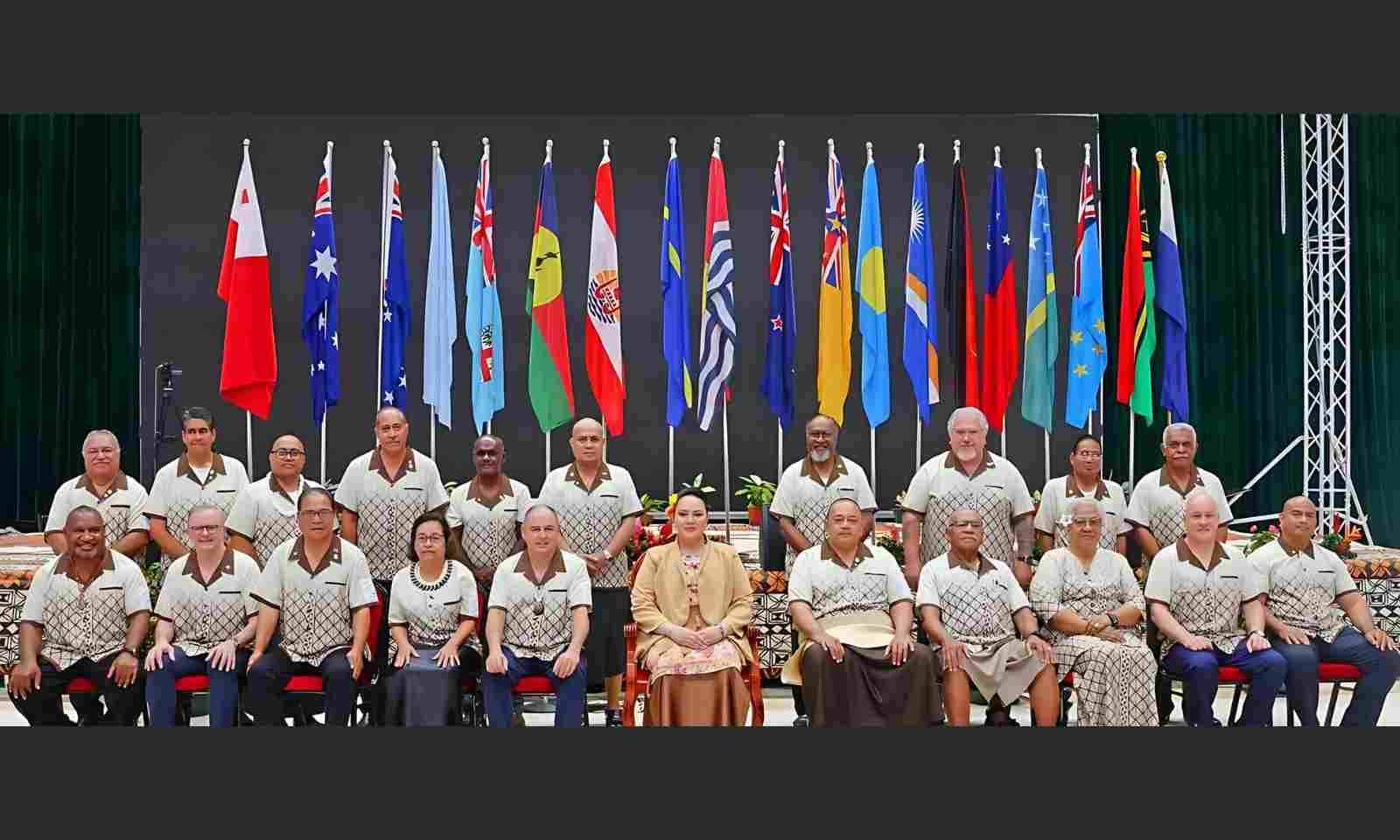

Pacific Islands Forum leaders on retreat in Vava'u on Thursday.
Photo/PIF
US-China tensions felt in Pacific leaders' meeting
Officials from Beijing and Washington have engaged Forum members to promote the goals and achievements of their Pacific partnership strategies.



Moana Pasifika end Lautoka curse to win 'Battle of the Pacific'


A.R.T sets new Pacific music pace with ‘First Thursday’ releases



Moana Pasifika end Lautoka curse to win 'Battle of the Pacific'


A.R.T sets new Pacific music pace with ‘First Thursday’ releases
It's been a busy year for China and the United States with the great power rivalry flaring up again - this time at the Pacific Islands Forum Leaders Meeting in Tonga this week.
To improve relations in the Indo-Pacific region and reduce China's influence, US Deputy Secretary of State, Kurt Campbell, says Washington has been listening carefully to the PIF and is committed to strengthening the regional governing body.
He said the US wanted the forum to become stronger.
Campbell arrived in the Tongan capital Nuku'alofa on Wednesday and went straight to work, reiterating Washington's support for initiatives such as climate change resilience, illegal fishing, education, technology, and connectivity across the Pacific region.
The US is one of more than 20 dialogue partners of the PIF, including China, the European Union, France, and the United Kingdom, among others.

Australian Prime Minister Anthony Albanese and US deputy secretary of state, Kurt Campbell, share a light moment. Photo/NDTV
Campbell said the US had sought new partners like Japan, South Korea, India, and Britain.
President Joe Biden has hosted Pacific leaders twice at the White House, announced plans to provide more than US$8 billion (NZ$13b) in new funding to the island states, released a US-Pacific Partnership Strategy, and opened missions in the Solomon Islands, Vanuatu, and Tonga.
The US recognised Niue and the Cook Islands as sovereign and independent states last year, establishing diplomatic relationships with both New Zealand realm nations.
Washington also expanded its aid offices in Fiji and Papua New Guinea, returning the Peace Corps to Sāmoa, Fiji, Vanuatu, and Tonga, and worked to improve the US consular services for easier travel.
Campbell said he believed institutionalisation in the Pacific at a regional level was "extraordinarily important".
The PIF leaders spent Thursday on a retreat to the northern island of Vava'u where a decision on the membership of US territories - Guam and American Sāmoa - is expected, among other things.
Watch Pacific Mornings' host William Terite's take on Winston Peters' climate change comments at the PIF leaders meeting.
With New Caledonia, a French territory and member of PIF, Campbell is hoping the leaders will also vote in favour of Guam and American Sāmoa.
But there is already opposition to this, with the Solomons' Foreign Secretary Collin Beck telling a group of journalists in Tonga that associate and full membership status of PIF are supposed to be for independent countries only.
Beck said this also met international law and the UN Charter, adding that the Solomons would like to see any decision made align with the regional governing body's rules.
The Solomons, Kiribati, and Nauru have severed ties with Taiwan in place of China, and the three are expected to vote against the two US territories joining PIF.
Solomons' officials have made it clear that they do not recognise Taiwan. This issue may resurface next year when the Solomons host the next leaders' meeting and Prime Minister Jeremiah Manele assumes the forum chair.
Chinese officials, including their top diplomat in the Pacific Qian Bo, have kept a low profile behind the scenes in Tonga.

US deputy secretary of state, Kurt Campbell, third from the left, and his team hold a media briefing in Nuku'alofa on Wednesday. Photo/PIF
But Palau, one of three Pacific nations that recognise Taiwan over China, has criticised officials acting as "fronts' for China.
President Surangel Whipps Jr warned any moves to sideline Taiwan were disrespectful to the forum and added that Palau would fight against such proposals.
He said there was pressure from external nations at the summit, and it was not welcome.
The Marshall Islands and Tuvalu are the other forum members that have maintained relations with Taiwan over China.
The leaders are also set to decide on Whipps Jr's nomination of Palau to host the forum leaders' gathering in 2026.
A key issue is the ongoing political unrest in New Caledonia. The forum is expected to resume its plans to send a fact-finding mission to the troubled French territory after a Troika-led delegation was deferred before the Tonga summit.
France has been under intense scrutiny over its handling of the unrest in Noumēa.

Pacific leaders with Tongan Princess Angelika Lātūfuipeka Mataʻaho Tukuʻaho in Nuku'alofa. Photo/Joseph Safiti
Campbell also announced US$20m (NZ$32m) investment towards a climate finance agency and US$50m (NZ$80m) for micro-loans. He said they would be extending visas to Tongans too.
Campbell and Australian Prime Minister Anthony Albanese were criticised after they were caught in a hot-mic incident that was recorded by an RNZ Pacific journalist.
The two men were discussing the Australia-backed Pacific Policing Initiative which Campbell is heard telling Albanese "the US has given you the whole lane" on the Pacific Policing Initiative (PPI). Albanese responded with an offer for the Americans to "go us halvies" on the US$400m (NZ$637m) project.
The exchange has been seen as Australia doing Washington's bidding in the region amid concerns China is gaining ground in defence and policing needs after Beijing signed a security pact with the Solomon Islands.
The US and its allies have raised their concerns about the agreement which could see the Chinese setting up a military base in Honiara - some 2200km from the coast of Australia.
The forum leaders meeting ends on Friday and Campbell will head to Vanuatu to dedicate the US' newest foreign mission, in Port Vila. He will also visit the Central Hospital and a repatriation of Vanuatu cultural artefacts.
Campbell will arrive in Auckland on Saturday to chair the US-NZ Strategic Dialogue, meet senior government officials, and launch the inaugural high-level Technology Dialogue.